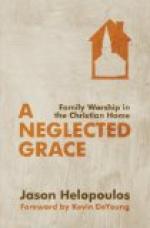The living stream of this sympathy is given by Christ in His address to the weeping daughters of Jerusalem: “Daughters of Jerusalem, weep not for me, but weep for yourselves and for your children!” The following is also its living utterance: “My son, if thy heart be wise, my heart shall rejoice, even mine.” We have also a beautiful exhibition of it in the touching history of Ruth, in the life of Joseph, and in the mother of Samuel. Peter describes it when he says, “Be all of one mind, having compassion one of another; love as brethren, be pitiful, be courteous.” Esther expresses it in the exclamation, “How can I endure to see the destruction of my kindred!” Paul gives utterance to it when he says, “I would be accursed for my brethren and kindred’s sake.” Jesus exemplifies it in His intercourse with the family of Lazarus; He shows its emotion and its active charities when He stands on the grave of that friend, and weeps, and calls him from the dead. His sympathy for a lost world is the true pattern of home-sympathy. It was disinterested, superior to all selfishness, self-denying, active, and prompting Him to do and suffer all that He did. It was not measured by the merits of the object after which it yearned. He sympathized with all,
“For each He had a brother’s interest in His heart.”
And its softening influence fell, like morning dew, upon the heart of adamant, melting it into contrition and love.
“In every pang that rends the heart,
The Man of sorrows had a part;
He sympathizes in our grief,
And to the sufferer sends relief.”
See Him bend over the bed of Jairus’s daughter; see Him opening the eyes of the blind, healing the paralytic, comforting and feeding the poor widow, and cheering the bereaved and troubled heart. Wherever He went He was “a brother born for them in adversity.” See Him on the cross, when weltering in blood and struggling with the pangs of a cruel death, He casts His languid eye upon His aged mother who is there weeping her pungent woes, and makes provision for her comfort. His sympathy now for all is the same.
“None ever came unblest away;
Then, though all earthly ties be riven,
Smile, for thou hast a Friend in heaven!”
It is this sympathy which makes Him a member of every Christian home. And when the sympathy of its members is the reproduction of His, they will, like Mary, sit in loving pupilage at His feet, each becoming the agent of blessings for all the rest. The wife will seek the salvation of her husband; the mother will labor with unwearied diligence for the redemption of her child.




